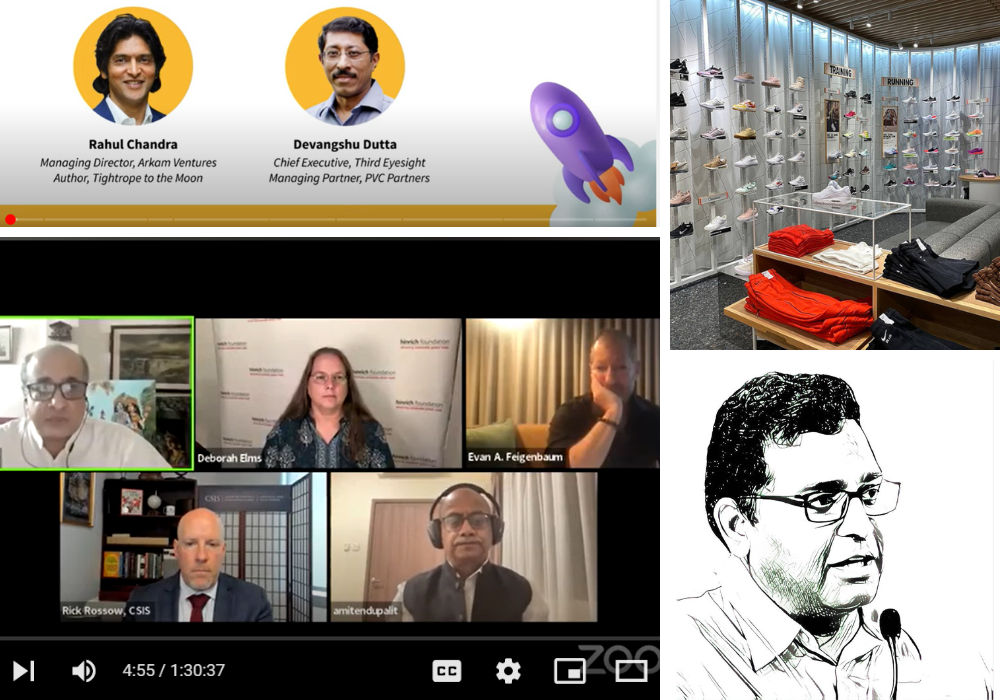As the year draws to a close, we took stock of our work through the year. Here are seven of our best stories—articles as well as videos of conversation— in Founding Fuel.
Tomorrow (Saturday, December 21) we will publish the best of FF Life, the weekend edition of our newsletter.
We will be on our customary year end break till January 3, 2025. We urge you to explore these stories over the holidays.
Happy holidays!
Team Founding Fuel
P.S. In case you missed it, we have an AMA (Ask Me Anything) session coming up this evening. In case you haven’t signed up, this is the time to do it.
V Ravichandar, Organiser of the Bangalore LitFest & Chairman of Bangalore International Center, and Shivendra Singh Dungarpur, Director of MAMI & Founder of the Film Heritage Foundation, will take your questions on how to make cultural festivals work, in a Founding Fuel AMA session.
- Sign up here: https://lu.ma/ribi5smz
7 Best Stories of 2024
1. [Read] Paytm: Emperor’s new clothes
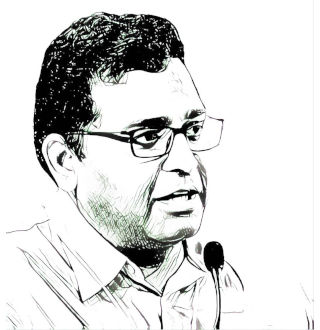
The story of the meltdown at Paytm, one of India’s largest fintech companies, dominated the headlines earlier this year. It has also led to intense debates about who is right and discussions on the future of Paytm, and even fintech in India. In this exclusive feature, our colleagues Indrajit Gupta and NS Ramnath shine a light on what went wrong with Paytm and how things might pan out going forward.
They write:
Sharma has repeatedly misled the regulator and flouted rules. A former senior general manager at RBI puts it down to Paytm’s founder’s excessive reliance on brinkmanship. “It is hard to believe anything he says. He would agree to do a few things that we would point out to him. But by the next meeting, none of those changes would be made,” he said. On occasion, he would even shed crocodile tears in the meeting with RBI, with tears running down his cheeks. And just five minutes later, he would be laughing loudly and smiling outside the room. “We weren’t sure he understood what regulation meant—and how to engage with us in a serious manner.” Sharma believed he was fully capable of saving the day, even when he was on the precipice. In many ways, he became his own biggest enemy.
Now, even the regulators themselves and his own employees say Sharma was always buzzing with ideas. He was passionate about problem-solving and loved to encourage his people to remove friction for customers. He clearly understood business risk and was willing to throw money to find technological solutions. The Sound Box designed to cut out fraud, was one such solution. Yet he was also a bit like an errant school boy, straining at the leash, unable or even unwilling to understand compliance risk. “So if he eventually decides to shoot himself in the head, there’s very little we can do,” says the same former director on the RBI board.
Read the story here
2. [Video] How mega founders unlock startup success - Part 1 and Part 2
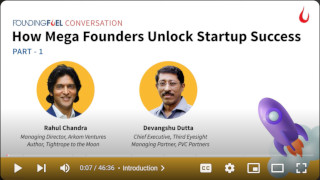
Rahul Chandra, author and MD of Arkham Ventures chatted with Third Eyesight’s founder and CEO Devangshu Dutta.
In part 1, they explored the unique traits of exceptional startup founders. They dug deeper into the idea of the ‘Key’. They discussed how successful founders balance rational execution with “good delusions” that enable ambitious goals, and emphasised the importance of a marathon mindset over short-term gains. There were practical tips on handling burnout (You have to fully experience emotions rather than suppress them) and maintaining a beginner's curiosity.
Part 2 challenged common assumptions about founder success, arguing that elite educational credentials, while helpful for networking, aren’t prerequisites for building successful startups. They also discussed the critical role of storytelling in startup success and shared interesting perspectives on the opportunities in Middle India.
Here’s a short excerpt from the highlights:
Devangshu: Are we driving dysfunctional behaviour among founders or founding teams, given the pressures of a VC fund which is closed ended?
Rahul: In India, most of the problems we are solving for in the venture-funded world are execution problems, aided by technology… This by nature is a very long [game]... Investors tend to not understand this and set [short] fund lives…
I don't think eventually investors can make a founder run faster. They can give them more money and encourage irresponsible behaviour by saying, where’s the growth?... They are coming at it by giving a large valuation themselves…. Here’s the big cheque, and now your valuation is suddenly some crazy number, but now I'm going to ask you for growth which will match up to that valuation…
The marathon mindset is exactly to this point. A mega founder will always want to move fast. You don’t want your best people to get hired by some other startup or your best investors to go away. So you want to be gaining market. But in your mind, the way you’re building is not a company that's going to live for three years…
The downside of thinking it is a short journey is, one, they exhaust themselves. They need to sustain energy over 10 years, while they're getting older… Second, the relationships you burn [by thinking it will not] come back and bite you, because you will be out in three years. And that's not what happens. It does come and bite you back."
Watch the videos or read the summaries: Part 1 & Part 2
3. [Read] Just Do It, Again

When Nike’s CEO John Donahoe came on board in June 2020, the company was battling assaults from digital retail. He seemed like the perfect candidate then to get the company out of the hole it was in. He started to dismantle the old ways of working and put in new structures. First, things looked good, bullish even. And then, everything started to fall apart. The company has gone back to call its old veteran Elliott Hill. Whatever happened? Nike went too far from its core, writes Harsh Vardhan, a strategist who works with some of the largest global brands and contributes to Founding Fuel as well.
An excerpt from the story:
“Iconic brands are driven by the founder’s vision and purpose. Successive generations keep the fire burning through a meticulously planned strategy that maintains the core with great success while adapting to the technological changes. Like Gucci, Louis Vuitton, or Hermes. Did Tag Heuer give up its sports association with the advent of digital and the perception that the new generation does not wear a watch? No. On the contrary it has over the 150 years of its existence kept up its appeal with its strong commitment to extreme sports, sponsoring Formula 1 and other such sports like surfing and sailing. It stayed away from the temptation of getting into the rat race of modern smartwatches, yet developed a technological marvel like Tag Carrera, a connected watch that has become one of the hottest selling luxury watches in Europe. In 2023, Tag Hueur had one of its best ever years. It holds a vital lesson for Nike.
Iconic brands have to make a choice—whom to target and whom not to target.
They cannot stand for everything. They have to stay focused, not give in to floating narratives and mass hysteria around new technology. Having created a culture of their own, they need to figure out ways and means to further that culture, bringing in newer customer segments through deep insight and an ability to stay relevant to the new era.
When L’Oreal bought The Body Shop, it pushed the latter decisively into online sales much like Nike, only to alienate its long-standing culture of highly engaging showrooms.”
Read the story here
4. [Video] Tech Titans and Billion Dollar Bets
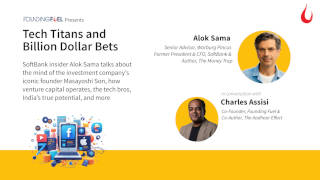
SoftBank insider and author of Money Trap, Alok Sama, talks about the mind of the investment company’s iconic founder Masayoshi Son, how venture capital operates, the tech bros, India’s true potential, and more.
What appears here is material that builds on the book and cannot be found elsewhere. Here is a snippet:
Silicon Valley’s ‘The India Story’ thesis
We're at probably close to peak hype when it comes to India. The only point I would make in defense of the ‘this time, it's different’ argument is that I think, relative to say, the last bull market, the Indian market this time is driven much more by domestic capital—which is healthy…
India is incredibly seductive, and people sometimes lose track of the fact that in terms of spending power, the numbers are incredibly small.
Watch the video/read the summary here
5. [Video] Masterclass: Heatwave, Flood & Water Stress: India Inc’s Tryst with Extreme Weather Patterns

Businesses need a holistic climate action plan. Now!
Corporates are already impacted by the changes on the ground — and it’s a rapidly evolving situation.
Especially in the last two years, we have seen unprecedented heat, abnormally high night temperatures, associated water scarcity, and the impact on crop yields — and it’s only going to get worse.
This Founding Fuel Masterclass was organised in partnership with Climate Trends. And we’d invited Archana Chaudhary, associate director, Climate Trends, to write a context-setting article before the masterclass.
Here’s an excerpt from the 10-minute summary:
Is this a reset moment for Indian businesses?
- Businesses are facing the reality here and now — you are not facing what could be in the long term.
- Between 1970 and 2019, the number of annual extreme weather events increased 5X.
- India is among the most vulnerable countries because of our size, lack of resilience and because of where we are located.
- We may account for 34 million of the 80 million global job losses by 2030, according to World Bank
- In 2019, we lost about $69 billion due to climate related events, which is close to the loss over the previous decade, from 1998 to 2017 — what we lost in a decade, we are losing in a year.
- The macroeconomic impacts:
- Shortages and fall in consumption
- Increased risks of flooding of residential property
- Investments would fall because you wouldn't know what is the right place to invest in
- Labour shortages. With extreme heat, people will not work on-site
- Drastic damages to physical assets
- Technology growth and innovation will divert away from things that improve to things that mitigate damage.
- What will be at risk:
- Business continuity
- Cash flows
- People’s health (physical health, climate anxiety, mental health)
- Productivity
- Ability to innovate
- Availability of capital
Watch the video/Read the summary here
6. [Video] Masterclass: Geopolitics and Global Trade - How It Impacts India
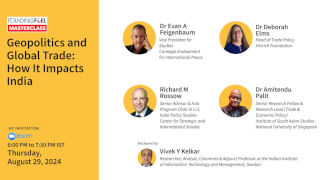
How is the US-China rivalry impacting the geopolitics of investment and trade? The Masterclass dived deep into the dynamics within the US, the competitive stakes in the Indo-Pacific, and where India stands amidst the rivalry. This was a by-invitation masterclass, with participants from business, academia, policy and media.
The full package includes three carefully curated Masterclass Briefings by Vivek Y Kelkar, a recorded session with our stellar panel, a comprehensive summary and reflections by experts.
Here’s an excerpt from the Masterclass summary, on China and India in the Indo-Pacific:
- The idea of Indo-Pacific is relative. The Chinese position is that China has been a part of the Indo-Pacific… But the Chinese reservation is with the US’ articulation of the Indo-Pacific.
- FDI is beginning to get dispersed the way the trend is shaping between countries…
- For example, Chinese investment into India is certainly not welcome in the most important sectors. But India never blocked Chinese investments by way of policy, even when the India - China hostilities were at their peak in June 2020….
- Vietnam has received a huge amount of Chinese greenfield FDI. It doesn't really fit into the political understanding of the China - Vietnam relationship.
- A huge amount of Chinese Greenfield FDI has also gone to Mexico. Whether one considers Mexico to be the backyard of the US or an extension of the Indo-Pacific is a different interpretation.
- US FDI might also start shaping in a way which is not totally one to one causality based.
Access the full package here
7. [Video] Masterclass: The World in 2024
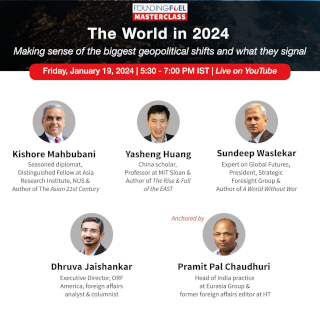
A stellar panel unpacked the primary drivers of complex change facing the world: The implications of elections in more than half the democratic world; the US-China rivalry and the economic disruptions of their mutual de-risking; assessing Global South as a tangible international entity; and more
Here are 5 takeaways from the discussion
1. The US will face the greatest uncertainty in the November Presidential elections
2. A potential win by a Republican candidate poses great risk from a geopolitical point of view.
3. Democracies will again bring nationalist forces to power like it did a 100 years ago
4. Those who predict the end of China’s growth story have got it wrong. The days of 8-9% growth may be over, but it will do very well if it can do 4-5% growth in the next decade.
5. 2024 is going to be a year of wars without winners
Watch the video/Read the summary here
